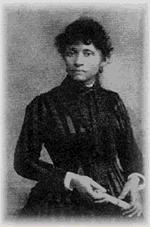

|
Speech to the IWW in 1905 This article donated by William Loren Katz Lucy Gonzales Parsons was strikingly beautiful, a powerful writer and speaker, and a life-long crusader for justice, but she has never appeared in a school textbook or a Hollywood movie. She began life with many strikes against her: she was of African, Indian and Hispanic descent, born a slave, worked hard, was poor all her life, and remained a staunch revolutionary dedicated to the emancipation of women and the world's oppressed. Parsons was a prolific writer, editor and speaker - arrested dozens and dozens of times - and never surrendered her revolutionary ideals. Yet few today have shown an interest in her writing or pathbreaking career. In 1905 Lucy Parsons was one of only two women (the other was the legendary Mother Mary Jones) among the 200 delegates who attended the founding convention in Chicago of the Industrial Workers of the World (IWW), America's most revolutionary labor union. The IWW aimed to knit together workers of both sexes and of every race, color and creed. The most powerful labor organization of the time, the American Federation of Labor, only sought to enroll white male skilled workers. The IWW recruited women, people of color, and the unskilled and semi-skilled workers in the mass production industries such as mining, steel and railroads. In a triumphant capitalist United States, the IWW had chosen a dangerous path. Lucy Parsons addressed the founding convention on two occasions and her speeches touched on issues close to her heart: the oppression of women and how to develop radical new tactics to win strikes. Her idea clearly were in advance of the time, presage the "sit-in" strikes of the 1930s, the anti-war movement of the 1960s, and her words resonate today. Delegate applause interrupted her speech several times and at the end. We, the women of this country, have no ballot even if we wished to use it, and the only way that we can be represented is to take a man to represent us. You men have made such a mess of it in representing us that we have not much confidence in asking you . . . We [women] are the slaves of slaves. We are exploited more ruthlessly than men. Whenever wages are to be reduced the capitalist class use women to reduce them, and if there is anything that you men should do in the future it is to organize the women. . . . Now, what do we mean when we say revolutionary Socialist? We mean that the land shall belong to the landless, the tools to the toiler, and the products to the producers. . . . I believe that if every man and every woman who works, or who toils in the mines, mills, the workshops, the fields, the factories and the farms of our broad America should decide in their minds that they shall have that which of right belongs to them, and that no idler shall live upon their toil . . . then there is no army that is large enough to overcome you, for you yourselves constitute the army . . . . My conception of the strike of the future is not to strike and go out an starve, but to strike and remain in and take possession of the necessary property of production. . . . . . . . Let us sink such differences as nationality, religion, politics, and set our eyes eternally and forever toward the rising star of the industrial republic of labor; remembering that we have left the old behind and have set our faces toward the future. There is no power on earth that can stop men and women who are determined to be free at all hazards. There is no power on earth so great as the power of intellect. It moves the world and it moves the earth. . . . I hope even now to live to see the day when the first dawn of the new era of labor will have arisen, when capitalism will be a thing of the past, and the new industrial republic, the commonwealth of labor, shall be in operation. I thank you. Lucy Parsons continued to fight oppression through her writing, speaking, and picketing, and was repeatedly jailed for her outspoken views. She was admired and loved by many who heard her voice and read her publications, and dispised by the rich and powerful who dreaded her message. In 1942 Parsons died when a mysterous fire raged through her Chicago home. By the time friends arrived the Chicago police and the FBI had seized and carted off her collection of manuscripts, papers, and books. They were never returned. Lucy Parsons ideas and words deserve to be remembered. Source: |